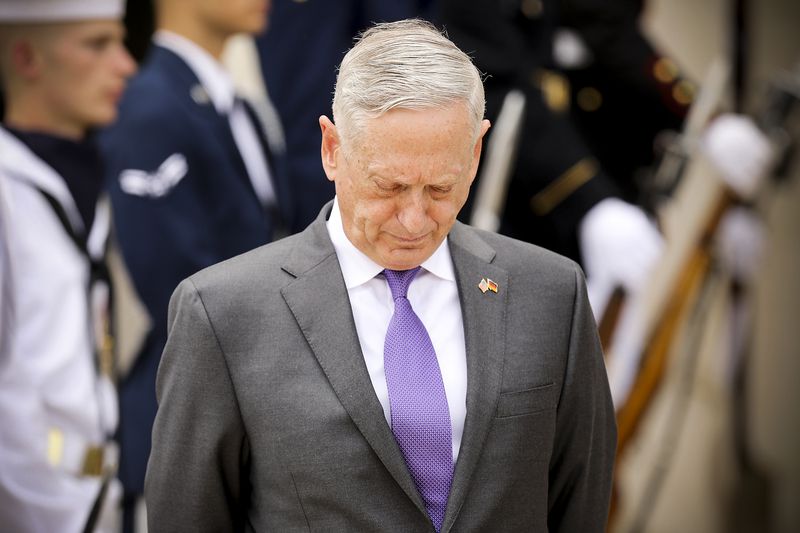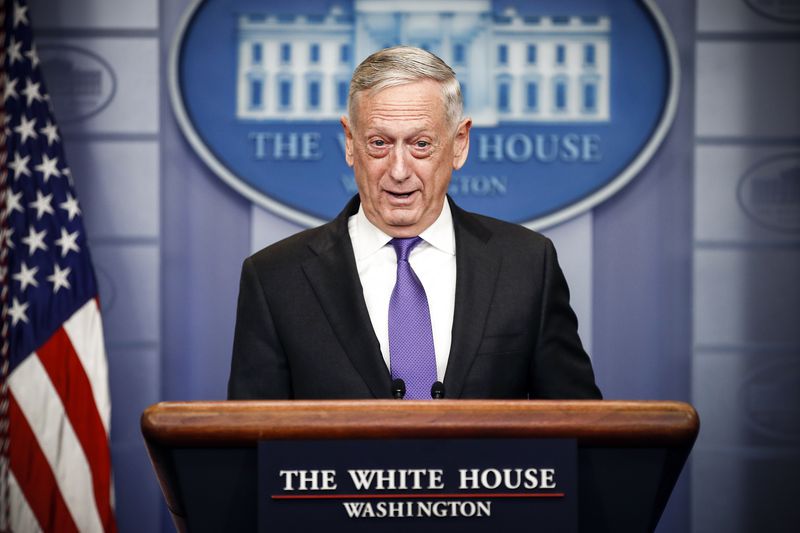
Trump made big announcements on North Korea and space. The Pentagon was surprised.
For much of his presidency, Donald Trump has backed the military, promising to support them as much as possible. But over the past two weeks, it seems that his administration has taken policies that affect the Pentagon without keeping it in the loop.
Take what happened right after Trump’s summit with North Korean leader Kim Jong Un last week. During a press conference, Trump vowed to end joint military drills with South Korea, catching the Defense Department almost, if not entirely, by surprise.
And on Monday, Trump announced the creation of an entirely new military service — the space force. The problem is there was no official, Pentagon-approved plan to make one yet, which is why Trump immediately dispatched Marine Gen. Joseph Dunford, chair of the Joint Chiefs of Staff, to look into establishing the new service.
 Jabin Botsford/The Washington Post via Getty Images
Jabin Botsford/The Washington Post via Getty ImagesAnd when speaking to reporters last Wednesday, Secretary of Defense Jim Mattis was obviously uncomfortable answering questions about what role, if any, the Pentagon may play in housing thousands of child migrants — seemingly trying to keep his department out of the political maelstrom.
This only adds to Trump’s complicated relationship with the military. Trump also surprised the Pentagon last summer by ordering a ban on transgender military service, withdrawing from the Iran nuclear deal, and contradicting top defense officials by saying that he wants US troops out of Syria.
But the president and the Pentagon seem more out of sync now than ever, as NBC News reported on Monday morning — and experts have some theories as to why.
John Bolton took over as national security adviser in April, which means there may still be some growing pains. “It’s not surprising that with a new National Security Council team there would be hiccups in communication, particularly if previously Mattis was closer to the president himself than [former National Security Adviser] H.R. McMaster,” Loren Schulman, a defense expert at the Center for a New American Security think tank, told me.
It could also be that the defense secretary wants to avoid the spotlight and not convey the Pentagon’s priorities more forcefully in public, allowing others to dictate the national security agenda. “Secretary Mattis has had a much lower profile, but that may well be his intent as he contemplates his own future,” says Mark Groombridge, formerly a top Bolton adviser at the State Department and United Nations.
Dana White, the top DOD spokesperson, told NBC News that it was “pure silliness” to conclude Mattis is out of the president’s decision-making loop or that Trump has started to sour on the secretary.
Whatever the reason, it’s disconcerting to see the Pentagon caught off guard in a time of great uncertainty, especially as relations with North Korea enter a sensitive stage while there’s and turmoil on America’s southern border.
That, to put it mildly, is not the best way for the world’s greatest military to operate.
It’s been a rough few weeks for the Pentagon
Trump kicked off the tumultuous past two weeks with a striking statement in Singapore.
“We will stop the war games [with South Korea] which will save us a tremendous amount of money,” Trump said a June 12 press conference after meeting with North Korea’s leader. “Under the circumstances we are negotiating a comprehensive and complete deal. It is inappropriate to have war games.”
 Saul Loeb/AFP/Getty Images
Saul Loeb/AFP/Getty ImagesThat was a big announcement. America’s security relationship with South Korea is the backbone of their alliance, and joint military exercises are the most visible way for Washington to show its commitment to Seoul. That’s why one would expect the president and his team to work with the South Koreans to cancel the drills responsibly.
But that’s not what happened, as Seoul and the Pentagon had no idea Trump would make that statement. In fact, America’s 28,500 troops in South Korea were still preparing for a joint exercise in August. A spokesperson for the US military in South Korea told the New York Times on June 12 that they had “received no updated guidance on execution or cessation of training exercises — to include this fall’s schedule Ulchi Freedom Guardian,” referring to the drill’s name.
And on January 18, a week after Trump’s announcement, the Pentagon announced it would not hold the August exercise with South Korea. “Consistent with President Trump’s commitment and in concert with our Republic of Korea ally, the United States military has suspended all planning for this August’s defensive ‘wargame,’” White, the top Pentagon spokesperson, said in a statement. White also noted that both countries have yet to make any decisions about other joint exercises.
On that same day, Trump stunned the military and Congress by announcing his desire to create a space force. Should it materialize, the space force would become the sixth military service. It would centralize the armed force’s activities in space, which currently reside mostly with the Air Force, under a whole new military branch.


 Alex Wong/Getty Images
Alex Wong/Getty ImagesUS Chairs of the Joint Chiefs of Staff Gen. Joseph Dunford (top left) Vice President Mike Pence (top right) and President Donald Trump during a meeting of the National Space Council, where Trump signed an executive order to establish the space force, an independent and co-equal military branch, as the sixth branch of the US armed forces on June 18, 2018.
The US has not created a new military service since 1947 when Congress authorized the Air Force. Forming a new branch out of thin air would require tons of planning and bureaucratic reorganization — but that didn’t matter to the president.
Instead, Trump assigned his top military adviser to figure out how to create the space force mere seconds after announcing his desire to establish it. Here’s the exchange during a space-related event at the White House last Monday:
TRUMP: We are going to have the Air Force and we are going to have the Space Force — separate but equal. It is going to be something. So important. Gen. Dunford, if you would carry that assignment out, I would be very greatly honored, also. Where’s Gen. Dunford? General? Got it?
DUNFORD: We got it.
TRUMP: Let’s go get it, General.
According to the Wall Street Journal on June 22, Trump made the stunning announcement after feeling that the Pentagon had stonewalled him for months. Trump had said since at least March he wanted the US to have a space force.
But Mattis, Dunford, and top Air Force officials all previously argued against creating the new military branch. Plus, the Pentagon studied the issue and effectively made the case that this “will happen, but now is not the time,” a source told the Journal.
Trump, however, clearly wants the space force to become a thing sooner rather than later.
In another example of the increasing disconnect, last Wednesday Mattis had trouble answering questions about how the Pentagon might house around 20,000 child migrants on military bases. Government officials visited four military bases in the past two weeks to see if they could potentially keep the children.
Reporters wanted to know what that signaled. The testy exchange, as transcribed by Task & Purpose’s Jeff Schogol, is worth reading:
REPORTER: HHS [Department of Health and Human Services] is looking at four US military bases in terms of housing the migrants…
MATTIS: We’ll see what they come in with. We support DHS [Department of Homeland Security] and right now this is their lead and we’ll respond if requested.
REPORTER: But would you allow the US military to house families or children in US military bases?
MATTIS: We have housed refugees. We have housed people thrown out of their homes by earthquakes and hurricanes. We do whatever is in the best interest of the country.
REPORTER: There are a lot of questions about children being separated from their parents…
MATTIS: You’re going to have to ask about the border and the situation [inaudible] the people responsible for it. I’m not going to chime in from the outside. There’s people responsible for it. Secretary Nielson [sic], obviously, maintains close collaboration with us. You saw that when we deployed certain National Guard units there, so she’s in charge…
REPORTER: With all due respect, sir, they have identified four US military bases that they say…
MATTIS: I’ve been working on other things today.
REPORTER: This has been going on for several weeks. So they have identified four bases…
MATTIS: We support whatever they need.
If you watch the edited video of the press conference above, it’s noticeable just how uncomfortable Mattis is.
“His body language said it all,” Groombridge, the former Bolton adviser, told me. “He will salute and follow orders to provide shelter but wants absolutely nothing to do with the political controversy swirling around this issue. His constant referral of the issue back to Homeland Security and Health and Human Services is clear evidence of this fact.”
However, it could also be that Mattis was uncomfortable speaking to reporters on camera by himself — something he typically tries to avoid.
Mattis purposely keeps his head down
It’s hard to know, especially now, just how much influence Mattis has with the president. According to NBC News, Trump and Mattis went from speaking several times a day on the phone to the secretary finding out about major policy decisions after the fact.
But whatever Mattis wants to achieve, he and other top Pentagon officials will likely continue to try to persuade Trump quietly because what the president wants is not necessarily what the Pentagon recommends.
 Chip Somodevilla/Getty Images
Chip Somodevilla/Getty Images“I am fully convinced that both the secretary and Joint Chiefs chairman are defaulting to a very passive public affairs posture and active and substantive private policy posture where they are being heard,” a former White House official told me.
Of course, it seems hard to convince Trump of anything. “I think perhaps [Mattis] has accepted the fact that no one in the administration is really able to stay in step with an unpredictable and unconventional boss,” says the former official.
Private consultation is one thing, but Mattis also doesn’t like explaining the Pentagon’s priorities much to the public.
 Carolyn Kaster/AP
Carolyn Kaster/APMattis has yet to conduct a press conference of his own in the Pentagon briefing room. He’s only appeared on one Sunday news show. He has yet to sit down for a profile. And he’s scaled back the number of reporters that travel with him from about 11 to six (or eight if a television crew comes along). In effect, Mattis doesn’t aim to make news.
That’s on purpose, Doug Wilson, a Pentagon senior spokesperson in the Obama administration, told me in March. “I think the way he’s dealing with the press both reflects his own natural instincts about not wanting to be in the limelight,” he said, “and also reflects the realities of this administration where focusing on your job and putting your nose to the grindstone is the best way to ensure you get to keep doing your job.”
But one has to wonder if failing to communicate the Pentagon’s priorities and viewpoint in the public sphere makes it harder for the private advice to resonate. After all, Trump is famously moved to act by what he sees on television.
Mattis’s personal communication style aside, it’s clear that Mattis and his Pentagon seem increasingly out of the loop on important national security decisions — and it doesn’t look like that will change any time soon.
 Chip Somodevilla/Getty Images
Chip Somodevilla/Getty ImagesRead More
https://cdn.vox-cdn.com/community_logos/52517/voxv.png


